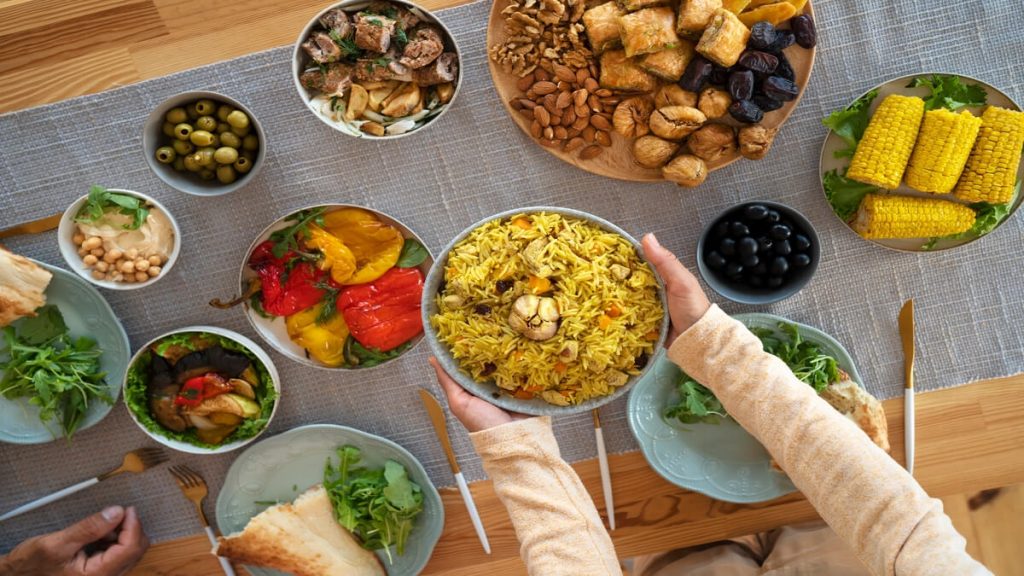Are you looking for an Ayurveda dinner plan to stay healthy and fit? If yes, then you are in the right place. After extensive research, I discovered that the wellhealthorganic.com:ayurveda-dinner is the best resource. You can visit and check it out using this link.
Ayurveda, an ancient system of medicine from India, emphasizes the balance of body, mind, and spirit to achieve overall health and wellness. One of the key aspects of Ayurveda is the focus on diet, particularly the meals consumed at different times of the day. Dinner, being the last meal of the day, plays a crucial role in maintaining balance and ensuring a restful night’s sleep. In this comprehensive guide, we will delve into the principles of an Ayurvedic dinner, the recommended foods, and how you can incorporate these practices into your daily life for optimal health and fitness.
The Principles of an Ayurvedic Dinner
Ayurveda teaches that our bodies are governed by three doshas: Vata, Pitta, and Kapha. Each dosha represents a combination of elements and energies that influence our physical and mental well-being. The balance of these doshas can be significantly affected by the foods we eat, especially at dinner.
1. Timing of Dinner
Ayurveda recommends having dinner early, preferably between 6 PM and 7 PM. Eating early allows the body to properly digest the food before bedtime, preventing issues such as indigestion and poor sleep quality. The digestive fire, known as Agni, is weaker in the evening, so consuming a light meal is advised.
2. Light and Warm Meals
Dinner should be light and easy to digest. Heavy and rich foods can strain the digestive system, leading to discomfort and disturbed sleep. Warm, cooked meals are preferred over raw foods as they are easier on the stomach and help maintain the digestive fire.
3. Balancing the Doshas
The choice of food should aim to balance the predominant dosha in the individual. For instance, those with a Vata constitution should opt for grounding and warming foods, while Pitta types should go for cooling and less spicy options. Kapha types benefit from light and mildly spiced meals.
Recommended Foods for an Ayurvedic Dinner
Here are some Ayurveda-recommended foods that you can incorporate into your dinner to stay healthy and fit:
1. Soups and Stews
Soups and stews are excellent choices for dinner as they are warm, easy to digest, and can be tailored to balance the doshas.
- Lentil Soup: Rich in protein and fiber, lentil soup is nourishing and filling.
- Vegetable Stew: A mix of seasonal vegetables cooked with spices like cumin, coriander, and turmeric provides a balanced meal.
2. Khichdi
Khichdi, a traditional Ayurvedic dish made from rice and mung dal, is a complete meal that is gentle on the stomach and highly nutritious. It can be spiced with ginger, cumin, and turmeric to enhance digestion and flavor.
3. Cooked Vegetables
Lightly cooked vegetables are ideal for dinner. Steaming or sautéing vegetables like spinach, zucchini, carrots, and green beans ensures they are easy to digest while retaining their nutrients.
4. Whole Grains
Whole grains such as quinoa, barley, and millet are excellent sources of complex carbohydrates. They provide sustained energy and are less likely to cause digestive issues compared to refined grains.
5. Herbal Teas
Ending your meal with a warm cup of herbal tea can aid digestion and promote relaxation. Ginger tea, fennel tea, and chamomile tea are all good options.
Sample Ayurvedic Dinner Recipes

To help you get started, here are some simple and delicious Ayurvedic dinner recipes:
1. Mung Dal Khichdi
Ingredients:
- 1 cup basmati rice
- 1/2 cup mung dal (split yellow lentils)
- 1 tsp ghee
- 1 tsp cumin seeds
- 1/2 tsp turmeric powder
- 1/2 tsp ginger, grated
- Salt to taste
- 4 cups water
- Fresh cilantro for garnish
Instructions:
- Rinse the rice and mung dal until the water runs clear.
- In a pot, heat the ghee and add cumin seeds. Let them sizzle for a few seconds.
- Add the grated ginger and turmeric powder. Sauté for a minute.
- Add the rice and mung dal to the pot and stir to coat with the spices.
- Pour in the water and add salt to taste.
- Bring to a boil, then reduce the heat and let it simmer, covered, until the rice and dal are cooked and soft (about 20-25 minutes).
- Garnish with fresh cilantro and serve warm.
2. Vegetable Stew
Ingredients:
- 1 tbsp olive oil
- 1 onion, chopped
- 2 cloves garlic, minced
- 2 carrots, chopped
- 2 zucchinis, chopped
- 1 cup spinach
- 1 tsp cumin powder
- 1 tsp coriander powder
- 1/2 tsp turmeric powder
- 4 cups vegetable broth
- Salt and pepper to taste
- Fresh lemon juice
Instructions:
- Heat the olive oil in a large pot. Add the onion and garlic, sauté until translucent.
- Add the carrots and zucchinis, cook for a few minutes.
- Stir in the cumin, coriander, and turmeric powders.
- Pour in the vegetable broth and bring to a boil.
- Reduce the heat and let it simmer until the vegetables are tender (about 20 minutes).
- Add the spinach and cook until wilted.
- Season with salt, pepper, and a splash of fresh lemon juice before serving.
Incorporating Ayurvedic Principles into Your Daily Routine
Adopting an Ayurvedic approach to dinner involves more than just choosing the right foods. Here are some additional tips to help you integrate these principles into your daily routine:
1. Mindful Eating
Eating mindfully, without distractions like television or smartphones, allows you to fully appreciate the flavors and textures of your food. This practice also aids digestion and helps you tune into your body’s hunger and fullness cues.
2. Chew Thoroughly
Chewing your food thoroughly is crucial for proper digestion. It helps break down the food into smaller particles, making it easier for your stomach to process.
3. Create a Calm Environment
A peaceful dining environment can enhance your eating experience and promote better digestion. Consider dimming the lights, playing soft music, or lighting a candle during dinner.
4. Avoid Overeating
It’s important to eat until you are satisfied, not stuffed. Overeating can strain your digestive system and disrupt your sleep.
5. Stay Hydrated
Drink warm water or herbal tea with your meal to aid digestion. Avoid cold beverages, as they can dampen the digestive fire.
Benefits of Following an Ayurvedic Dinner Plan
Incorporating Ayurvedic principles into your dinner routine can offer numerous health benefits, including:
1. Improved Digestion
Following an Ayurvedic dinner plan can enhance your digestive health by ensuring that you consume easily digestible foods at the right time.
2. Better Sleep
A light and early dinner can promote better sleep by reducing the likelihood of indigestion and discomfort during the night.
3. Balanced Energy Levels
Eating a balanced dinner can help stabilize your energy levels, preventing late-night cravings and maintaining overall vitality.
4. Enhanced Mental Clarity
A proper diet can also influence mental clarity and emotional well-being, helping you stay focused and calm.
5. Weight Management
By avoiding heavy and late-night meals, you can manage your weight more effectively and reduce the risk of obesity-related health issues.
Recent: Wellhealthorganic.com: Know the Causes of White Hair and Easy Ways to Prevent It Naturally
Conclusion
An Ayurvedic dinner plan is a holistic approach to eating that can significantly improve your overall health and well-being. By focusing on the principles of Ayurveda, such as eating light, warm, and balanced meals, you can enhance your digestion, sleep quality, and energy levels. The recommended foods and recipes provided by Wellhealthorganic.com serve as a great starting point for anyone looking to adopt this ancient practice into their modern lifestyle. Visit wellhealthorganic.com:ayurveda-dinner for more detailed guides and recipes to help you stay healthy and fit with Ayurveda.
